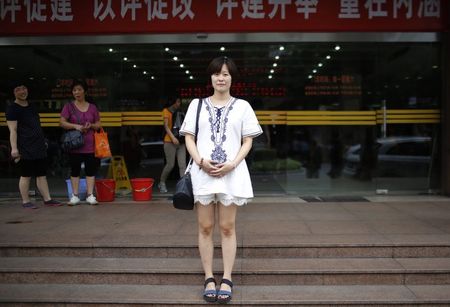By Carlos Barria
BEIJING (Reuters) - China's Communist Party leaders have praised their one-child policy for preventing the population from spiralling out of control, but critics say it has spawned decades of forced abortions, infanticide and child trafficking.
China, the world's most populous country with nearly 1.4 billion people, says the policy has averted 400 million births since 1980, saving scarce food resources and helping to pull families out of poverty.
Critics say it has created a generation of spoilt brats and re-enforced a cultural preference for male heirs who can better take care of their parents in old age - if couples are allowed only one child, many want to make sure it is a boy.
"The parents put all their eggs in one basket," said Huang Zheng, born in 1980. "This generation carries the burden of too much pressure. But it has already become the norm, because everyone is in the same situation."
Couples violating the policy have had to pay a fine, or in some cases have been forced to undergo abortions. China fined acclaimed film director Zhang Yimou 7.5 million yuan (£775,855) in January for having three children.
But late last year, China changed tack and said it would allow millions of families to have two children, part of a plan to raise fertility rates and ease the financial burden on a rapidly ageing population.
Under the old rules, urban couples were permitted a second child if both parents did not have siblings and rural couples were allowed to have two children if their first-born was a girl. But now urban couples can have a second child if just one of them is an only child.
There are other exceptions, including looser rules for ethnic minorities.
DOUBLE STRESS
Growing up as an only child brings added pressure to meet parental expectations, many say, not to mention pressure from grandparents who may have just one grandchild to dote on.
Zhang Bowen, born in 1985, said modern life in China presented double stress - as an only child, he alone is responsible for the welfare of his wife and child and his parents.
"I would like to have had a sister or a brother," he said. "Because I would have felt less lonely when I was growing up ... As your parents get older, it would be good to have brothers and sisters to share the responsibilities."
While taking pictures of children and their parents, some were very shy, as though not used to company, while others jumped into poses straight away, as if they were used to hamming it up for the camera. One child born in 2008, without any encouragement, immediately started doing kung fu moves.
"I don't want to have older brothers or sisters or younger ones either, because I don't want them to mess up all the things in the house," he said.
One girl, born in 2009, has all her toys stacked up in the living room, dominating the family space.
Asked if she wished she had a brother or sister, she said: "I don't. Because my mother would dote on him or her."
Many experts say China urgently needs a baby boom to help replenish its workforce and shoulder the costs of an ageing population.
The working-age population has shrunk by almost six million over the past two years to 920 million, National Bureau of Statistics data show. China's elderly population, meanwhile, is projected to hit 360 million by 2030, from about 200 million today.
But even with the rule changes, family planners say, some couples may find urban life too expensive to support a second child.
^^^^^^^^^^^^^^^^^^^^^^^^^^^^^^^^^^^^^^^^^^^^^^^^^^^^^^^^>
Link to pictures: http://reuterspix.com/pp/gfj_one_child/
Video: http://reut.rs/1CNW47O

^^^^^^^^^^^^^^^^^^^^^^^^^^^^^^^^^^^^^^^^^^^^^^^^^^^^^^^^>
(Writing by Nick Macfie)
